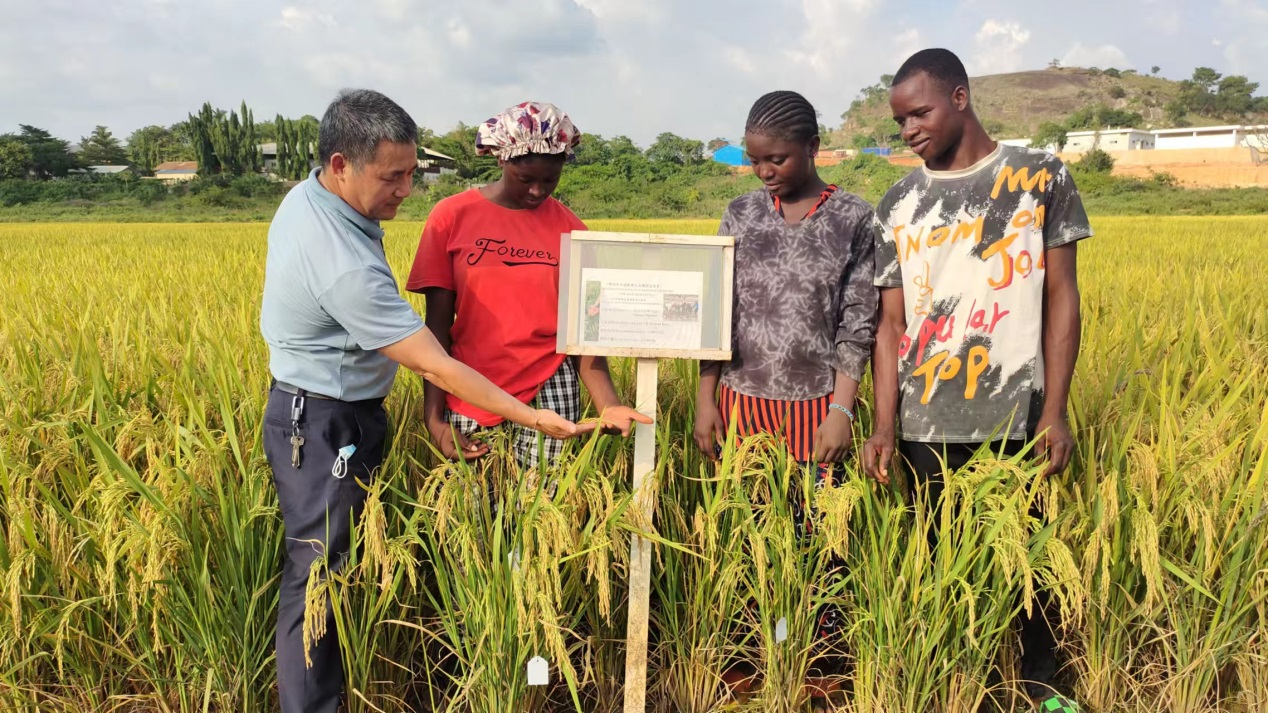Editor's note: The China-Africa relationship is a deep, long-lasting and multi-faceted one, with diplomatic, trade and economic, and development links stretching back to the 1950s. Recent decades have seen this cooperation reach new heights and extend further than ever. In this article, Obai Khalifa, Deputy Director for Agricultural Development at the Bill & Melinda Gates Foundation, examines the expanding field of agricultural cooperation and identifies equality as the bedrock of successful partnerships.

Obai Khalifa, Deputy Director for Agricultural Development at the Bill & Melinda Gates Foundation (Photo courtesy of Bill & Melinda Gates Foundation)
It was wonderful to be back in China in June for the third China-Africa Economic and Trade Expo (CAETE) in Changsha. Since its inauguration in 2019, CAETE has become an important platform for expanding the China-Africa relationship, of which agricultural cooperation is an increasingly significant element, and the scale of the activities in Changsha was testament to the scope and ambition of all those involved in China-Africa exchanges. On the same trip I was also able to visit several leading agricultural research institutes in Beijing that our foundation has been working with on their journey to form partnerships with their African counterparts. Even as someone familiar with this field, I was struck by the seriousness of the commitment I saw among Chinese scientists to improving agricultural productivity in Africa through collaborations that seek to adapt and transfer Chinese innovations to the African context.
Just as important as innovation and technical expertise, though, is the spirit in which such collaboration is undertaken. That is why I was so encouraged to find a deep commitment to building China-Africa partnerships on a foundation of equality among the scientists and business people I met with. China viewing Africa as an equal partner is of utmost importance not simply on principle, but for the quality of outcomes from these partnerships.
So, what are the elements of this kind of equal partnership, and what does it look like in practice? I want to answer this by examining the centrality of smallholder farmers in both China and Africa, the role of private-sector partnerships, and the importance of listening to the voices and expertise of the farmers themselves. All these elements are on display in a China-Africa partnership we are currently funding to boost rice production in Nigeria and Mali; an ambitious program that perfectly illustrates the combination of technical excellence, locally informed business engagement and mutual respect that are the essential ingredients of successful collaboration.
Smallholder farming is central to the agricultural experience of both China and Africa, laying the groundwork for mutually beneficial cooperation.
Agriculture is a core component of African economies, contributing over 17% of GDP for more than half of its countries, compared to a global average of just over 4%. Agriculture accounts for an estimated 60% of the continent’s workforce, and 80% of these farmers are smallholders. These farmers face considerable challenges in accessing resources, with limited financial options blocking their access to transformational technologies that would allow them to benefit from breakthroughs in agricultural science. This results in crop and livestock yields often far lower than their counterparts in other developing countries. These entrenched issues are further exacerbated for many by climate change, economic downturn, conflict and political instability.
For all their obvious differences in climate and geography, China and Africa’s agriculture share a key characteristic in the centrality of smallholding. China’s 2019 agricultural census revealed that smallholder farmers account for 90% of the agricultural workforce and cultivate over 70% of arable land in China. The agricultural transformation that this smallholder-driven sector has wrought over the last 40 years has been central to China’s wider economic growth, feeding 20% of the world’s population with just 8% of its arable land and laying the foundation for more than 700 million people to be lifted out of poverty.
It is hardly surprising, then, that Africa is keen to learn from China’s experience over these recent decades. Our foundation has been working to enable this since 2008, when we began our partnership with the Chinese Academy of Agricultural Sciences (CAAS), supporting their work to develop “Green Super Rice” suitable for African and Southeast Asian markets. CAAS in turn collaborates with the International Rice Research Institute and Africa Rice, and as of 2019 these partnerships had generated 78 climate-resilient and disease-resistant, high-yield rice varieties benefitting over 1.6 million households across 18 African and Asian countries. This research has also given rise to the development of water-saving and drought-resistant rice (WDR) which have been successfully demonstrated in many provinces of China, illustrating how the benefits of international collaboration flow in both directions.

A Chinese expert and Nigerian farmers test new rice varieties introduced under a China-Africa cooperative project. (Photocourtesy of CGCOC Group)
In the latest project under this long-term program, we are supporting CAAS’s collaboration with the Nigerian Cereal Research Center with the goal of developing and bringing to market new breeds of rice suitable for the challenges faced by smallholder farmers in Nigeria and Mali. These strains need to be resistant to blast disease – the most serious disease affecting rice crops globally – and able to stand stresses made increasingly common by climate change, including drought, flooding and salinity. The project started with an evaluation of China’s “Green Superb” rice variety in Nigeria, and using the lessons drawn from trials of this and other varieties, applied advanced molecular-level breeding techniques to enhance the resistance of Nigeria’s two most common rice varieties. These two varieties were then grown at four demonstration sites during the 2022 dry season, where they recorded yields averaging 30% and 50% higher than the popular local varieties.
Private sector partnerships are indispensable for extending the benefits of agricultural innovation.
At this stage, with a proven product, it might seem that a project like this is complete. In fact, however, achieving a scientific breakthrough like this is only half of the struggle to address a real-world problem. The next stage comes in integrating this innovation into a functioning seed system that can ensure the new rice breeds reach the farmers they are intended for – and that requires the market to do its work.
Attracting the necessary investment to agriculture in Africa has often been an uphill struggle. Heavy upfront inputs, high climate-induced risks, and the long payback cycles of agricultural investments have long hampered efforts to direct much-needed resources to the sector. This is why our foundation takes a holistic approach, working with the private sector alongside government and scientific partners. Our experience has shown that a creative approach to engaging businesses and entrepreneurs is often the key to unlocking potential.
In Nigeria, we have been working with locally engaged Chinese companies who have entered cooperation agreements with six regional seed distributors, covering pesticides, agricultural machinery and solar-powered pumps, in addition to the seeds themselves. The breadth of this approach, along with additional training and forums organized by the companies, ensures that farmers acquire the knowledge and equipment to exploit these scientific advances to their full potential, alongside the seeds themselves. Meanwhile, the companies work to promote the product, particularly to Sino-Nigerian food and hospitality businesses, with over 225 tons sold and processed to date. Market engagement like this, in which companies are naturally the experts, is vital in ensuring ongoing demand for the produce of the smallholder farmers who will switch to growing these new varieties.
Listening to farmers' voices must be central to any successful partnership.
The worst thing a program like ours can do is start to consider ourselves the “experts” and forget to listen to the farmers who have the lived experience of facing and overcoming challenges, often through great creativity, adaptability and resilience. We’re lucky to work in an organization where this mindset is embedded from the top down. Our co-chair Melinda French Gates talks in her book, The Moment of Lift, about the skewed outcomes that result when agricultural researchers only engage with male farmers when developing new seed varieties. Men frequently make decisions over seed buying, but planting and harvesting is typically done by women, and this experience gives them subtly different considerations. If the rice stalks are too short, they must constantly bend down to harvest, making the process slow and arduous. They feed this back to their husbands, who in turn stop buying the new seed – meaning the researchers need to go back to the drawing board, and a lot of effort has been wasted.
To win the trust of farmers for new agricultural innovations, whether tools, seeds or farming techniques, there is no substitute for face-to-face contact and “getting your hands dirty” on the ground. One example I learned from our Chinese partners is their unsuccessful attempt to persuade local farmers to replace the widely adopted broadcasting method with the Chinese rice seedling technique in some of their demonstration sites in Nigeria. After consulting local farmers, they realized that despite its effectiveness in increasing yields, the Chinese rice seedling technique was too complex for short-term adoption. They worked with locals to co-develop a direct seeding method that reduces labor, conserves resources, shortens growth periods, and enhances weed resistance compared to broadcasting. While yields are still lower than rice seedling preparation, they show a significant improvement over broadcasting. The ease of this approach has encouraged more farmers to cultivate rice and adopt new seed varieties, expanding local production and boosting community income.
Looking to the future
The worsening impact of climate change and the ongoing regional conflicts are exacerbating global food security, particularly in African nations. Only by working together can we address this challenge. China has shown its commitment to deepening agricultural cooperation with African countries.
Looking ahead, the Second Forum on China-Africa Cooperation in Agriculture scheduled for November this year in Hainan, China, and the 2024 Forum on China-Africa Cooperation Summit will bring more momentum for China-Africa agricultural cooperation through bilateral and multilateral channels.
It is our foundation’s privilege to play its part in enabling this through transformative projects like the one in Nigeria and Mali. The spirit of equal partnership that we have witnessed in this cooperation will continue to ensure that scientists, innovators and business leaders from both sides work together to benefit smallholder farmers across Africa in the years to come.
Some of the highlights in this article will be published in the international semi-annual journal Contemporary China and the World.